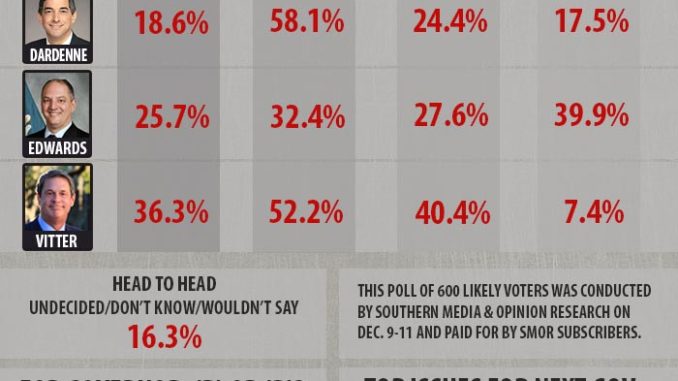
Louisiana’s open primary system allows for all candidates, regardless of party, to run on a single ballot, which in races for governor has traditionally created a runoff with a Republican versus a Democrat.
If the current field of four established candidates, with just one Democrat running, remains the same come this fall, that pattern will repeat itself, according to a poll of 600 likely voters conducted last month by Southern Media and Opinion Research.
Against the other declared candidates for governor, U.S. Sen. David Vitter of Metairie, a Republican, leads in the SMOR poll with 36 percent. He’s followed by state Rep. John Bel Edwards of Amite, the lone Democrat, at 26 percent. The two other Republicans trailed, with Lt. Gov. Jay Dardenne of Baton Rouge at 19 percent and Public Service Commissioner Scott Angelle of Breaux Bridge at 3 percent. The undecided vote totaled 16 percent.
Should another major Democrat get in the race, however, Edwards may have a tougher time holding on to his projected 26 percent, which in turn could possibly create an all-GOP runoff like Louisiana saw in recent elections in the 5th Congressional District in 2013 and lieutenant governor in 2011.
Qualifying for governor takes place in early September, followed by an October primary and a November runoff if needed.
Asked what the top issue should be for the next governor, voters once again confirmed Vitter’s thinking on making Common Core, and to a larger extent education policy, central to his early policy narrative. The leading category, at 35 percent, was education, schools and teachers, followed by the economy and jobs at 26 percent. Vitter is opposed to Common Core.
Should the race pit one party against another, the poll suggests it could be a repeat of the 2014 U.S. Senate race, where incumbent Mary Landrieu, a New Orleans Democrat, lost her seat to Congressman Bill Cassidy, a Baton Rouge Republican.
In the SMOR poll, Vitter carried the Republican vote, about 61 percent, while Edwards led the Democratic column with 44 percent of the take. But like Landrieu, Edwards runs into trouble with white Democrats, trailing Vitter in the category 33-27, and he’s behind with white voters overall as well.
Poll participants were asked whether they would pick a Republican (44 percent) or Democratic (33 percent) for governor. Broken down further, only 17 percent of white respondents opted for a Democratic candidate, which is one point less than the percentage of the white vote Landrieu received in the November primary. Only 9 percent of the black respondents picked the Republican candidate.
Dardenne, who received 19 percent from white Democrats, may have the best shot of increasing the percentage of black support for a Republican should he make the runoff. He’s tied with Vitter at 13 percent black support, to Edwards’ 56 percent. But in a separate set of poll questions about the job performance of statewide elected officials, Dardenne showed a relatively low “poor” job performance among Democrats, about 8 percent.
Public Service Commissioner Scott Angelle could also run closer to the middle in this race, given his huge geographic base in Acadiana, which has yet to blossom but will eventually. Angelle would, however, have to be more deliberate about it than Dardenne.
SMOR partner Bernie Pinsonat said that would take considerable finesse. “It’s certainly possible to do that but you have to run a different kind of campaign,” Pinsonat said.
“The atmosphere from Washington has made this race about national Democratic policies. And who is the poster child for the anti-Democratic theme? Vitter. Running down the middle would really buck recent trends. Mike Foster ended up running to the far right. So did Bobby Jindal. Will someone break this mold? That’s what this race is about.”
Asked why they wouldn’t support a Democrat, GOP poll participants surprisingly chose President Barack Obama as their lowest-ranked answer, with just 6 percent going with the stock campaign narrative from this fall. Ideological differences accounted for 16 percent; performance in office, 13 percent; socialist leanings, 12 percent; political philosophy, 6 percent; fiscal policy, 6 percent; and party loyalty, 6 percent.
Democratic respondents were asked the same, providing the following: Lack of empathy, 20 percent; party loyalty, 16 percent; Gov. Bobby Jindal’s performance, 11 percent; overall performance in office, 11 percent; bias, 8 percent; fiscal policy, 6 percent; and tradition, 6 percent.


Be the first to comment